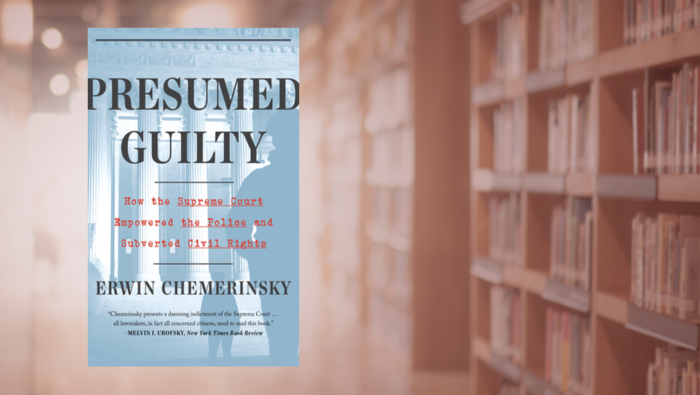
The Books We Don’t Recommend but Can’t Stop Thinking about

The end of the calendar year is a dangerous time for my book buying budget. I’m a sucker for the ‘best books of the year’ lists from both the typical publications and my friends raving on social media. I am at risk of buying so many books in January that I have no time for the books that will be released in the coming twelve months.
From that perspective, I hope you may appreciate the value of a different kind of year-in-review: a reflection on the book that nagged me the most–but that I would stop short of recommending. In 2022, the book that lived rent-free in my head is Presumed Guilty: How the Supreme Court Empowered the Police and Subverted Civil Rights, by Erwin Chemerinsky. The current dean of the law school at the University of California-Berkeley, Chemerinsky’s illustrious career includes academic leadership, voluminous scholarship, and numerous appearances before the U.S. Supreme Court. Despite being quick to assign his book to my students in a Spring 2022 course, something nagged at me months later. What might the act of writing about it now reveal?
The book’s straightforward title captures his contribution to the ongoing struggle for accountable police practices in the United States and an end to violence at the hands of the state. Chemerinsky’s approach is to turn to the Supreme Court’s criminal justice jurisprudence, including the many decisions issued by the Court during the relatively progressive 1960s era, known as the Warren Court. ‘Relatively’ is the key word, because although his chronological narrative rightly turns the attention to the conservative retrenchment in a variety of areas, he doesn’t shrink from criticizing the usual liberal heroes whose judgments nevertheless served to empower police. In this respect, Presumed Guilty moves successfully to take on board the critical appraisals of modern liberal approaches. And of course, there’s abundant criticism for the conservative directions that the U.S. Supreme Court has taken over the past fifty years.
What nagged me and my eagle-eyed students was the uncritical way that Chemerinsky could throw a key adverb into this sentence: ‘Putting all this together, it is clear that the Supreme Court has contributed enormously to the problem of policing, and race-based policing, in the United States’ (p. 272). ‘Enormously’. That may be his conclusion, but it was also his starting point when introducing the book’s emphasis. ‘…[M]eaningful change generally requires court action and court enforcement,’ he wrote, arguing that ‘constraining the police and protecting people’s rights greatly depends on the Supreme Court’ (p. 28). There’s much that Socio-Legal Studies has to say about such a top-down approach. When, on the penultimate page, Chemerinsky asks, ‘How do we eliminate the racism that too often has affected law enforcement?’ (p. 307), I couldn’t help but think that in the face of America’s legacy of white supremacy and cultures of racism, the Supreme Court wasn’t so enormously influential. A factor, for sure, and perhaps even a sine qua non of a holistic strategy, but still shaking the wrong end of the stick.
If I’m completely candid in this moment, part of my irascibility with Presumed Guilty stemmed from a desire to grab the author by the lapels of his suit coat and say, ‘you should know better than to think the answer comes from the top!’ From a distance, I have admired his current home, Berkeley, as one of the major hubs of Socio-Legal scholarship. Once upon a time, I sat at dinner with Dean Chemerinsky at a Law and Society workshop where he provided the keynote address. I understand that his career has centred on constitutional law, but at a human level, I assumed he had been in conversation with enough first-rate Socio-Legal scholarship that he would have turned an analytic corner and decentred the high court. After all, he had already written a book titled, The Case Against the Supreme Court (2014), which had indicted our faith in this institution. So: jurisprudence, yes, but in better balance with society.
What was bothering me all along, then, was certainly not Chemerinsky’s politics nor even most of his analysis in the study. Once I set aside my irascibility – of which I am all too often prone these days – there was really nothing personal about my complaint. Rather, I now take from the book an insight into how difficult it is to de-centre some modes of thinking about law, and even more, how difficult it is to translate Socio-Legal approaches to popular audiences. Socio-Legal Studies offers a rejoinder to a court-centric view of the law. Complexity, not simplicity, pervades the interaction of social forces in the legal field. There is no harm in examining, as Chemerinsky did, a limited part of that field; usually that’s all one can attempt. But please, then, be honest about the partiality of one’s view. That prescription may make scholarship about law difficult to sell to wider audiences, but at least it will keep you off someone’s annual ‘not recommended’ list.

